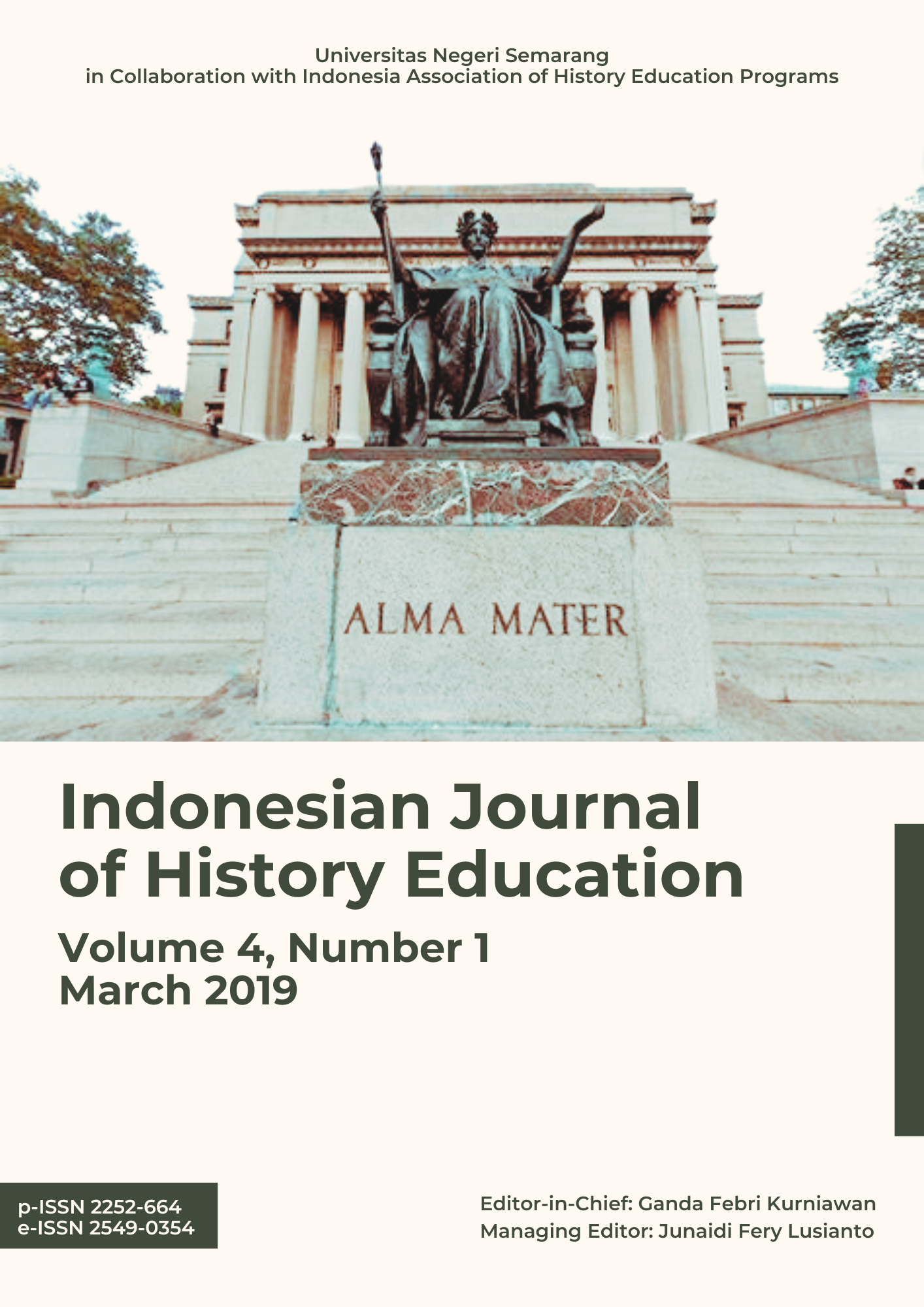The Influence of Zeitgeist on Historical Content in High School History Textbooks Curriculum 1975-2004
Abstract
This study explores the relationship between the ruling regime and the hegemonic educational framework by examining the content of history textbooks within this context. The research used historical methods to collect comprehensive data from official and unofficial written historical sources. The findings indicate that the prevailing spirit of the age, as dictated by the authorities in power, significantly influenced the content of history education. Specifically, the study reveals that the educational agenda was strategically utilized to sustain and reinforce Suharto's power through the history curriculum from 1975 to the KBK Curriculum in 2004. The results demonstrate how the regime's interests permeated the educational sphere, shaping the historical narratives presented to students in a way that served to legitimize and perpetuate the ruling authority. This manipulation of historical content within textbooks underscores the broader dynamics of power and control in the educational sector, illustrating the extent to which education can be co-opted to maintain political dominance. Through this detailed analysis, the study contributes to a deeper understanding of the intersection between political authority and educational content, highlighting education's critical role in preserving hegemonic power.
References
Afrianti, T., Wurdjinem, W., & Kustianti, S. K. (2018). Kemampuan Siswa dalam Memahami Bahan Ajar Sejarah Perjuangan Rakyat Bengkulu pada Aspek Kognitif dan Aspek Afektif pada Mata Pelajaran Muatan Lokal di Kelas V Sekolah Dasar Negeri 49 Kota Bengkulu. Jurnal PGSD: Jurnal Ilmiah Pendidikan Guru Sekolah Dasar, 11(1), 8-18.
Ahmad, T. A. (2016). Sejarah Kontroversial Di Indonesia: Perspektif Pendidikan. Yayasan Pustaka Obor Indonesia.
Amin, S. (2011). Pewarisan Nilai Sejarah Lokal Melalui Pembelajaran Sejarah Jalur Formal dan Informal pada Siswa SMA di Kudus Kulon. Paramita. 21(1).
BP3K. (1976). Statistik Persekolahan 1974. Depdikbud.
BP3K. (1978). Statistik Persekolahan 1977. Depdikbud.
BP3K. (1982). Statistik Persekolahan 1980/1981. Depdikbud.
Gainau, M. B. (2016). Pengantar metode penelitian. PT Kanisius.
Hartono, Y. (2017). Model pembelajaran nilai-nilai karakter bangsa di Indonesia dari masa ke masa. Agastya: Jurnal Sejarah Dan Pembelajarannya, 7(01).
Haryatmoko, J. (2010). Dominasi penuh muslihat: akar kekerasan dan diskriminasi. PT Gramedia Pustaka Utama.
Hasan. H. S. (1997). Kurikulum dan Buku Teks Sejarah dalam Kongres Nasional Sejarah 1996 Jakarta Sub Tema Perkembangan Teori dan Metodologi dan Orientasi Pendidikan Sejarah. Proyek Inventarisasi dan Dokumentasi Sejarah Nasional Direktorat Jenderal Kebudayaan Departemen Pendidikan dan Kebudayaan.
Hikmawati, F. (2016). Bimbingan dan konseling. Rajawali Press.
Kentli, F. D. (2009). Comparison of Hidden Curriculum Theories. European Journal of Educational Studies 1(2), 83-88.
Magee, G. A. (2010). The Hegel Dictionary. New York: Continuum International Publishing Group.
Martono, N. (2014). Dominasi kekuasaan dalam pendidikan. Jurnal Interaksi, 8(1), 28-39.
Muhammad, G. (2017). Pada masa intoleransi. IRCiSoD.
Nurhajarini, D. R., & Purwaningsih, E. (2015). Akulturasi lintas zaman di lasem: perspektif sejarah dan budaya (kurun niaga-sekarang). Fibiona.
Pawi, A. A. A. (2009). Zeitgeist Di Cakera Nusantara: Zeitgeist In Malay Archipelago. Jurnal Pengajian Melayu (JOMAS), 20(1), 1-25.
Perdana, D. I. (2013). Kurikulum dan Pendidikan di Indonesia: Proses Mencari Arah Pendidikan yang Ideal di Indonesia atau Hegemoni Kepentingan Penguasa Semata?. Jurnal Pemikiran Sosiologi, 2(1).
Rohman, A., Muhadjir, N., & Suyata, S. (2014). Dinamika Relasi Politik Antara Otonomi Guru dan Dominasi Kekuasaan. Jurnal Pembangunan Pendidikan: Fondasi dan Aplikasi, 2(2).
Setiawan, H. (2003). Kamus Gestok. Galang Press (Anggota IKAPI).
Subekti, S. (2012). Tinjauan Kritis terhadap Kecenderungan Historiografi Indonesia Masa Kini. HUMANIKA, 15(9).
Sufyan, F. H. (2014). Sang Penjaga Tauhid: Studi Protes Tirani Kekuasaan 1982-1985. Deepublish.
Sutjiantiningsih, S. (1995). Pengajaran Sejarah Kumpulan Makalah Simposium. Depeartemen Pendidikan dan Kebudayaan Direktorat Jendral Pendidikan Tinggi.
Syukur, A. (2012). Membangun Karakter Bangsa Lewat Sejarah (Refleksi 65 Tahun Pengajaran Sejarah di Indonesia). Diakses http://nuansapendikar.blogspot.co.id/2012/membangun-karakter-bangsa-lewatsejarah.html (5 Febuari 2016).
Wardah, E. S. (2014). Metode penelitian sejarah. Tsaqofah, 12(2), 165-175.
Copyright Notice
An author who publishes in the Jurnal Indonesian Journal of History Education agrees to the following terms:
- Author retains the copyright and grants the journal the right of first publication of the work simultaneously licensed under the Creative Commons Attribution-ShareAlike 4.0 License that allows others to share the work with an acknowledgement of the work's authorship and initial publication in this journal
- Author is able to enter into separate, additional contractual arrangements for the non-exclusive distribution of the journal's published version of the work (e.g., post it to an institutional repository or publish it in a book) with the acknowledgement of its initial publication in this journal.
- Author is permitted and encouraged to post his/her work online (e.g., in institutional repositories or on their website) prior to and during the submission process, as it can lead to productive exchanges, as well as earlier and greater citation of the published work (See The Effect of Open Access).
Read more about the Creative Commons Attribution-ShareAlike 4.0 Licence here: https://creativecommons.org/licenses/by-sa/4.0/.




